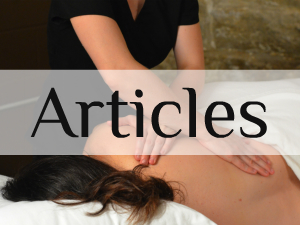Frequently asked questions regarding massage therapy
What should I expect during my first massage therapy visit?
First, I will have you fill out a health history form. I will ask general questions to establish what areas you would like worked on, if there are any conditions needing to be addressed, and to determine if massage is appropriate for you. It is important to list all health concerns and medications so your session can be adapted to your specific needs without doing any harm. It is also important to list any allergies so that I am aware and know not to use a specific oil during treatments.
Do I have to be completely undressed?
For a full body massage, most clients undress completely and the parts of the body not being worked on are draped appropriately with sheets and/or towels during the massage; however, many clients feel more comfortable, especially during the first sessions, leaving some clothing on. It is entirely up to you, and you can undress to your personal level of comfort. I will leave the room and you will be given full privacy to undress and get comfortable on the table.
What is your treatment room like?
Please see my massage therapy treatment room.
Do I have to cover myself with a sheet or towel?
Yes. You must be properly draped at all times with a sheet to keep you warm and comfortable. Only the area being worked on will be exposed.
What do I do during a massage treatment?
Prior to the massage, feel free to ask any questions about the technique or the upcoming session. During the massage, make yourself comfortable and relax. I will either gently move you or tell you what is needed throughout the session (such as lifting your arm). Many people just close their eyes and completely relax, communicating if/when they need more or less pressure, another blanket, or anything else relevant to the session. If you have any questions regarding the session or about the particular technique you are receiving, feel free to ask.
Will the massage hurt?
This depends on the type of massage and the depth of the strokes. A light, relaxing massage that doesn’t probe very deep into the muscles, shouldn’t hurt. With that being said, there is a ‘feels good’ hurt and an ‘ouch, stop it’ hurt. A good massage, even a really deep tissue massage, should always stay in the ‘feels good’ hurt range.
Pain can be an indication that the muscle is possibly injured or inflamed and pressure should be adjusted. Always communicate any pain during a session with your therapist. Also, pain can cause you to tighten up and negate the relaxing effects of the massage. The most effective and deepest massage always works with your body’s natural response, not against it.
How often should I get a massage?
It varies from person to person. If you are just looking for some occasional relaxation, then a session every 3-6 weeks may be fine for you. However, if you are looking to address a specific condition, then it is recommended to go more frequently at first and then slowly taper down to a maintenance schedule. Sometimes more frequent 30-minute sessions can be effective until your goals are met and a maintenance schedule is in place. Frequency of sessions should be discussed after your treatment.
How will I feel after my massage treatment?
Most people feel very relaxed. Some experience freedom from long-term aches and pains developed from tension or repetitive activity. After an initial period of feeling ‘slowed down’, people often experience increased energy, heightened awareness, and greater productivity which can last for days. After your session you should increase your water intake a bit. Just a glass or two more than normal is usually fine. This helps keep your body’s tissues hydrated and healthy.
How many sessions will I need?
Honestly, its hard to say. Every person is unique and every condition is unique to each person. It may take one session or it may take several. We will be able to talk more specifically about this after your first session.
When should I NOT get a massage?
You should not book a massage if you have a fever, cold/flu, or contagious skin infection.
There are many other conditions in which massage techniques may need to be adapted (i.e. arthritis or osteoporosis) or avoid an area completely (i.e. cuts or burns). It is very important that you inform me of any health problems or medications you are taking. With some conditions it is a good idea to get an approval from your physician before you receive massage (cancer, certain heart conditions, pregnancy). This doesn’t mean you can’t get massage. But its always better to error on the side of caution. Depending on the condition, approval from your doctor may be required.
If you have any other questions, please don’t hesitate to ask. You can call or send me a message via Facebook.

 Follow
Follow








Leave a Reply